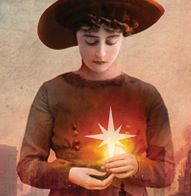
"Morning Star" Makes History
Ricky Ian Gordon’s “Morning Star,” Cincinnati Opera’s first
main stage world premiere in over 50 years, alternately charmed and befuddled
its audience Thursday night in Corbett Theatre at the School for Creative and
Performing Arts.

While the music was rewarding -- mostly arioso with spoken dialogue, part opera, part Broadway -- it was easy to get lost in the convoluted plot.
With libretto by William H. Hoffman, based on the 1940 play
by Sylvia Regan, the opera centers on a family of Jewish immigrants
living on Manhattan’s Lower East Side in the early 20th century. Performing in the pit were members of the Cincinnati Symphony Orchestra, led by Christopher Allen. Stage director was Ron Daniels.
Act I begins in the summer of 1910. Sisters Sadie and Esther
Felderman are in love with the same man, Harry Engel. Fanny Felderman has aspirations to
be a singer. Songwriter Irving Tashman pays a visit and sings a song he has written for her. The Feldermans
have a tenant, Aaron Greenspan, who has yet to make his mark in the world. The Felderman women work at the Triangle Shirtwaist Factory in New York's Greenwich Village.
The scene shifts to March 25, 1911. It is Esther and Harry's wedding day and the day that fire destroyed the historic Shirtwaist Factory, killing146 mostly immigrant women. Esther is pregnant. Fanny has married Irving. Sadie thinks Esther has become pregnant in order to trap Harry.
Act II transpires 21 years later. Aaron Greenspan, who now runs a successful hat-making business, returns to Becky’s apartment and asks her to marry him. They reminisce over the past, during the course of which the ghosts of Esther and Hymie Felderman appear. Esther perished in the Triangle Shirtwaist Factory fire. Hymie, a soldier, died in World War I.
Sadie has become a successful businesswoman. Fanny has married Irving. Harry professes unhappiness with his marriage to Sadie. Sadie asks Becky to convince Aaron Greenspan to help break the workers’ union, but she refuses. The act ends with Becky accepting Aaron’s proposal of marriage.
The opera had both a prologue and an epilogue, each having
to do with the Shirtwaist Factory fire. Historical photos framed the
prologue, while a dramatic vision of the building on fire, with Esther and her
friend Mary O’Fallin inside, formed the epilogue.
The action took place before a triangular cut of the Shirtwaist Factory, against which historic photos were projected. Becky’s apartment had a sofa, piano, mannequins and a table and chairs.
Vocally, the opera was a great success. All parts were inhabited by talented singer actors. The cast included soprano Twyla Robinson as Becky, sopranos Jennifer Zetlan and Elizabeth Zharoff as Fanny and Esther and mezzo-soprano Elizabeth Pojanowski as Sadie. Harry Engel was baritone Andrew Lovato, with baritone Morgan Smith as Aaron Greenspan and tenor Andrew Bidlack as songwriter Irving Tashman. Pearl and Prince, a pair of street vendors who added warmth to the story, were well sung by soprano Jeanine De Bique and tenor Larry Hylton.
Bass-baritone Kenneth Shaw made an imposing Rabbi Engel, who
sings the Kaddish as the factory burns in the epilogue. Baritone Spencer Viator
was the soldier Hymie Felderman. Owen Gunderman was the young Hymie Felderman
and also Becky's grandson, Hymie Tashman. Mezzos Adria Caffaro and Leah de Gruyl sang Irish
immigrants Mary and Kathleen O’Fallin. (Mary also perishes in the fire.)
Despite its complexity, there were many memorable moments in “Morning Star." The name derives from the song "Morning Star," sung in act I by Irving Tashman (tenor Bidlack), who accompanied himself on the piano. The song, “For This I Left My Homeland,” sung in act I by Becky, Aaron, Mary and Esther, gave plaintive voice to the feelings of the immigrants. “Columbus Sailed the Ocean Blue in 1492,” another Felderman ensemble led by Becky (who is learning English), saw the Stars and Stripes appear in the background.
“The Family Abides” (while “men come and go”) was a touching
moment in act I, as Becky empathized with Sadie over her love for Harry. Fanny had her
moment to shine in “If I’m Not Allowed to Sing," while Prince and Pearl’s “So Many
Colors” was also a standout (both also in act I).
Shaw was magisterial as Rabbi Engel, signing off the opera
with the Kaddish as flames consumed the factory in the epilogue.
“Morning Star” repeats at 7:30 p.m. July 8, 10, 12, 17 and
19 in Corbett Theater at the School for Creative and Performing Arts. For
tickets, call (513) 241-2742, or visit www.cincinnatiopera.org